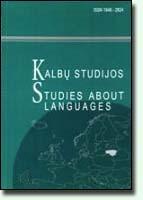From the Lexicon to the Explanatory Combinatorial Dictionary
From the Lexicon to the Explanatory Combinatorial Dictionary
Author(s): Anna GinterSubject(s): Language and Literature Studies
Published by: Kauno Technologijos Universitetas
Keywords: generative grammar; Meaning-Text model; semantics; Chomsky; Melchuk; lexicon; Explanatory Combinatorial Dictionary
Summary/Abstract: The Meaning-Text approach is viewed as ‘an outgrowth and natural continuation of the generative-transformational approach’ since the most immediate foundations of the Meaning-Text Theory are to be found in Chomsky’s theory (Mel’čuk 1981, p. 56; Gladkij, Mel’čuk 1969, p. 7). As a matter of fact, the Meaning-Text Theory adopted the fundamental assumptions and terminology of the standard theory by Chomsky, in its search for more developed model of language functioning. It is obvious, however, that the Meaning-Text Theory as influenced by other works, theories and studies (for example, observations referred to the Machine Translation and works of Soviet semanticists) must differ in many points from Chomsky’s approach. The most significant difference is connected with the fact that the Meaning-Text Theory develops the idea of language-independent semantic representation and provides examples of semantic decomposition of lexical meanings. What is more, contrary to the standard theory, Mel’čuk, Zolkovsky and Apresjan proposed the principle of using highly involved syntax in Semantic Representation. For the reasons presented above, the main goal of my paper is to show the main assumptions of the two theories taking into consideration components that seem parallel in the approaches proposed by Chomsky and Mel’čuk. Both the lexicon in the standard theory and the Explanatory Combinatorial Dictionary in the Meaning-Text Model refer directly to semantic aspects of the two linguistic descriptions. The lexicon consists of an unordered set of lexical entries and certain redundancy rules, while the Explanatory Combinatorial Dictionary is to comprise all the semantic and combinatorial data concerning the relationships of a given word to other words. It would be worth analysing the two elements from the point of view of their design, rules, foundations and value for the further scientific explorations – which is the objective of the paper.
Journal: Kalbų Studijos
- Issue Year: 2006
- Issue No: 8
- Page Range: 20-26
- Page Count: 7
- Language: English

